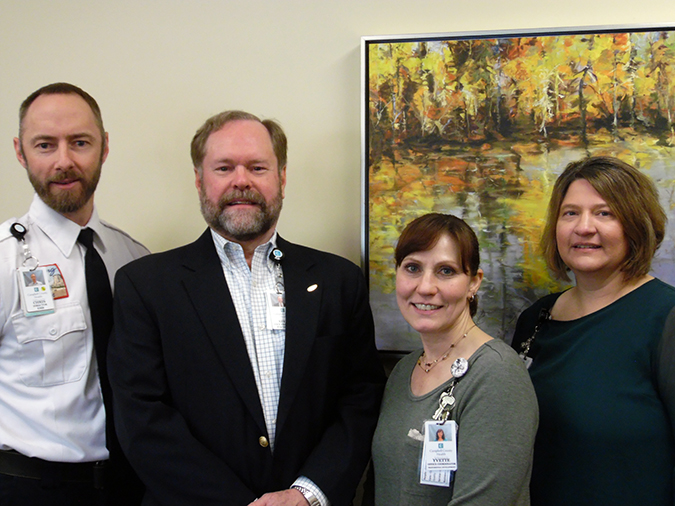
The February 2019 Department Discovery is not focusing on a department
this month, but on a committee of staff at Campbell County Health.
For those who don’t know, all of CCH’s staff plays a key role
in emergency preparedness and response efforts for all types of events
such as natural or man-made disasters, infectious disease outbreaks (for
example hantavirus, measles, or zika) or even attacks in the Campbell
County, Wyoming community or within the organization (including drills
focused on missing children or wandering residents). And at CCH, we have
a committee formed specifically for this: Emergency Preparedness.
The CCH Emergency Preparedness Committee helps all CCH employees be as
prepared as possible for a variety of disasters that could occur through
classes, drills and exercises, and after action reviews.
The Emergency Preparedness Committee is coordinated by Chris Beltz,
Emergency Medical Services Director; Trina Chick,
Plant Operations (not pictured); Steve Crichton Vice President of Facilities and Plant
Operations; Yvette Land,
Professional Development, Infection Prevention, and Case Management Office Coodinator; and Natalie Tucker, RN, Professional Development, Infection
Prevention, and Case Management Director. There are representatives from several
departments that serve on this committee.
This Committee meets monthly and helps with ensuring we are all ready when
disaster strikes. In addition, all staff at CCH participate in training
and drills on a regular basis to ensure knowledge and competency in disaster response.
This year, the Committee is spending time on consolidating CCH’s
Emergency Preparedness policies and the Continuity of Operations Plan,
as well as continue to plan drills to help monitor the organization’s
readiness for when a possible disaster may strike.
Let’s give this five-person committee a round of applause. Thank
you for working so hard to help us be ready for any kind of emergency.
For individuals or families, emergency preparedness should also be a consideration—and
may include plans on how to respond to a house fire, extreme weather,
an extended power outage or an evacuation. The U.S. Government advises
individuals and families to have their own emergency plans including an
emergency kit, a family emergency plan and a family communications plan.
A good resource on how to create a family emergency preparedness plan
is available by Federal Emergency Management Agency at
https://www.ready.gov/.